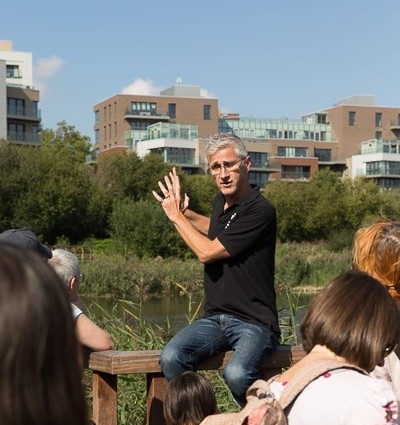
Mathew Frith at Bramley Bank
Photo credit: Eve Edwards
Bramley Bank
Photo credit: Eve Edwards

Mathew Frith at Bramley Bank
Photo credit: Eve Edwards
Mathew grew up in south Croydon with his parents Margaret and Ted, his younger siblings Penny and Toby, an assortment of cats, guinea pigs and gerbils, in a house full of books. From an early age, Mathew was full of energy and curiosity, especially when it came to the natural world. Much of his childhood was spent exploring the nearby Littleheath Woods and Croham Hurst Woods and the surrounding fields, seeking out birds, reptiles, and wildflowers. He often returned home with a jar of caterpillars to rear, and fondly recounted the time his family watched peacock butterflies emerging from pupae hanging from the lid of their television. Holidays on the Isle of Wight would find him knee deep in rockpools, catching gobies and teasing sea anemones, or scrambling up cliffs in search of dinosaur bones, though never finding any. Aged just seven, Mathew wrote a book on butterflies and moths, finding it again decades later tucked in a box in a dusty loft, much to his delight.
Music was a prominent feature of Mathew’s teenage years. Initially shaped by the eclectic tastes of the Frith household, with later choices contoured by the politicised discontent of New Wave and punk. Absconding between lectures to the arts campus during a degree in Zoology at Exeter university brought new friends and influences. Band projects that were variable in eccentricity and influence, culminated in an offer, ironically through a Croydon connection: in the late 1980s Mathew played bass guitar on a tour of Europe with rock band Loop. Yet, by the time Mathew played the Reading Festival in 1989, dragonflies felt more rock and roll than after-show parties, and having already connected to the Trust’s Centre for Wildlife Gardening through his associates at the London Ecology Unit – where he worked from 1987 – he changed his trajectory.
In 1990 “the best job in the world” turned up, Mathew joined the staff of London Wildlife Trust proper, becoming the Warden of Sydenham Hill Wood. This was the beginning of Mathew’s two distinct periods of endeavour at London Wildlife Trust, each formative in Mathew’s development as a conservationist, but also formative for the Trust, as changes in leadership met demands from changes in policy and the funding landscape. For five and a half years Mathew managed the wood, working alongside volunteers and learning the workings of an urban woodland. Understanding that urban conservation meant working with and engaging people as much as protecting nature itself, the Wood reflected many of Mathew’s personal passions - its ties to the Great North Wood, its railway history and its place in south London. Even his style of dress set him apart from the hippy-like image of conservationists at the time, instead wearing suits, polka dot shirts and pointed boots. He knew that to win over sponsors, funders, or politicians, dressing the part could mean the difference between being taken seriously or not.
Mathew’s remarkable ability to share that enthusiasm with others - making context, content, and importantly the social value of custodianship visible, converted dog-walkers and joggers alike to value and care for Sydenham Hill Woods. It was a style of thinking and delivery that would continue to define the power of his advocacy.
Promoted to Conservation Manager in 1996, Mathew spent the next four years overseeing the Trust’s unstaffed reserves and guiding London Wildlife Trust’s shift towards landscape-scale projects, while also shaping the emerging London Biodiversity Partnership. Building on the Trust’s pioneering work of the 1980s – most notably surveys of The Great North Wood – he worked to build on this legacy through innovative, large-scale initiatives. He secured funding and support for many landmark projects such as Staggering Gains (Stag Beetle Survey) and Dragonfly Detectives - all of which showcased his commitment to citizen science and biological recording. Mathew’s fascination with butterflies, particularly their relationship to habitat management, made sites like Bramley Bank and Hutchinson’s Bank personal favourites. Thanks to his activism and determination, these and other vital habitats continue to thrive today.
After a decade at the Trust Mathew stepped away between 2000 and 2009, but remained connected, serving as an active and highly engaged Trustee from 2002. He worked firstly at national level as Urban Advisor to English Nature, then, from 2002 to 2009 as Landscape Regeneration Manager at Peabody Trust. By now a renowned advocate and big-picture policy adviser for biodiversity in towns and cities, Mathew nevertheless remained the champion of under-regarded natural spaces: ‘Paradise Preserved’ provided land management advice for cemeteries (English Nature, 2007). At Peabody, Steve Howlett CBE, Chief Executive from 2003-2017 recalls:
I arrived at Peabody in 2003 to find a completely new and fresh approach to creating vibrant green spaces in urban London estates and promoting wildlife. It was all initiated and led by Mathew. He worked with residents across our estates to build bird boxes – I particularly remember the Cockney Sparrow programme we had to help rebuild the population of this once common bird. A special feature of Mathew’s work was the way that he involved residents and their children, so the projects and green spaces belonged to them. It was great to see bird boxes springing up on our estates from King’s Cross to Westminster, Farringdon and Waterloo.
Working with CABE Space, the Neighbourhoods Green project raised £300,000 to improve the green spaces of six housing estates, work that reinforced Mathew's belief that access to nature is a matter of environmental justice – and his firm conviction that nature is for everyone, rich or poor, in town or countryside.

Mathew Frith giving a talk at Woodberry Wetlands in 2015
Mathew returned to the Trust in 2009 as Deputy CEO, while also serving as Director of Conservation. He provided a steady hand over a period of leadership transitions, guiding the Trust back to its core purpose. In the years that followed, he was a trusted mentor and grounding presence to colleagues, supporting the development of others’ careers and helping the Trust remain on track and true to its purpose, a mission he had helped shape from the early years at the Trust.
In 2014, standing on an overgrown reservoir site in Hackney, Mathew described his vision for what would become Woodberry Wetlands: a flourishing London Wildlife Trust reserve with a café and education hub. Two years later, the site was opened by Sir David Attenborough. This was swiftly followed by the opening of Walthamstow Wetlands in 2017 – a project he was involved with influencing as early as 2008 as trustee. Mathew was the guiding influence behind these landmark achievements, yet he was equally committed to the ‘forgotten corners of London’, ensuring that smaller, less visible sites were never overlooked by the Trust.
Between 2013 and 2025, Mathew served as both Director of Planning and Policy and Director of Policy and Research, roles that cemented his standing as one of London’s leading conservation voices. In these positions, he worked to embed nature conservation into the city’s planning system, shaping policies that ensured space for wildlife was designed into new developments from the onset, rather than as an afterthought.
Alongside his leadership within the Trust, Mathew’s influence reached across London’s wider conservation landscape. He played a pivotal role in shaping how the Greater London Authority approached planning and nature recovery, combining deep knowledge with a thoughtful, diplomatic approach that enabled him to win over both hearts and minds. This gave both the Trust and the sector as a whole a stronger platform for influence. When the London Rewilding Taskforce was established, it was only natural that Mathew was asked to be part of it - no one knew London’s wildlife better. He was central in helping define what rewilding could mean in the capital and how it could benefit both wildlife and Londoners.
Despite his momentous contributions to nature recovery in London and beyond over the past 30 years, Mathew remained modest and humble throughout his life, preferring to amplify the achievements of others above himself. When in 2023 he was awarded an MBE for services to the natural environment, he somewhat reluctantly accepted this honour, taking comfort "that many others working for nature will deservedly achieve similar recognition in due course".
Mathew was deeply committed to his work – and to the people and wildlife of London. There was no corner of London he wouldn’t visit, no talk he would turn down and no community group he would ignore. He’d been a Green Flag judge since 2004 and a Council member of the Linnean Society since 2019. During the Covid pandemic, he was desperate to get back into the office. When the lockdown lifted, Mathew would have been the first one back (after a 7am swim at Brockwell lido), sitting at his desk, surrounded by stacks of paper, busily typing and eating peanut butter on ryebread that was always stashed in his drawer. He was constantly busy, and yet always made time for people, showing great generosity with both his time and his knowledge. There wasn't a question he wouldn’t help answer, in detail and with great care. Mathew was kind and infinitely patient. A love of travel was always in his blood, regularly taking off for a weekend in search of lynx in Spain, owls in Finland or bison in Poland. In 2000, while on an Earthwatch flora expedition to western Cameroon led by Kew Gardens, Mathew discovered a new species of Busy Lizzie, later named in his honour – Impatiens frithii. A fitting tribute for someone who was always on the go.
His love of history, especially the story of London’s natural and industrial heritage, gave Mathew a unique ability to set context and bring places to life. A talented storyteller, writer, and editor, he was known for beautiful poetic postcards sent to family and friends, and for his distinctive style of white clothes, rings, and bangles. More recently, Mathew was pursuing an MA in Nature and Travel Writing at the University of Bath. His creativity set him aside within the conservation sector, from imaginative projects like illuminated trails through Sydenham Hill Wood to playful touches on report titles such as Peaty Finders and In a Rut. Mathew had a gift for distilling history, art, and nature into something tangible that people could connect to, inspiring a sense of wonder in those he shared it with.
With Mathew, everything and everyone was equal – a common plant was as deserving of his attention as the rarest butterfly. He was a truly inimitable character, and few gave more to nature in this city than he did. London’s wildlife has lost its greatest champion, yet Mathew’s legacy will live on in the countless people he inspired and the landscapes he helped to protect. While we may feel his loss hugely, Mathew didn’t like fuss; he’d rather us continue the work we have set out to do in his spirit of determination, professionalism and continued passion for the wildlife and wild spaces of London.
Married in 2011, Mathew is survived by his wife, Keren - as well as by Penny and Toby.